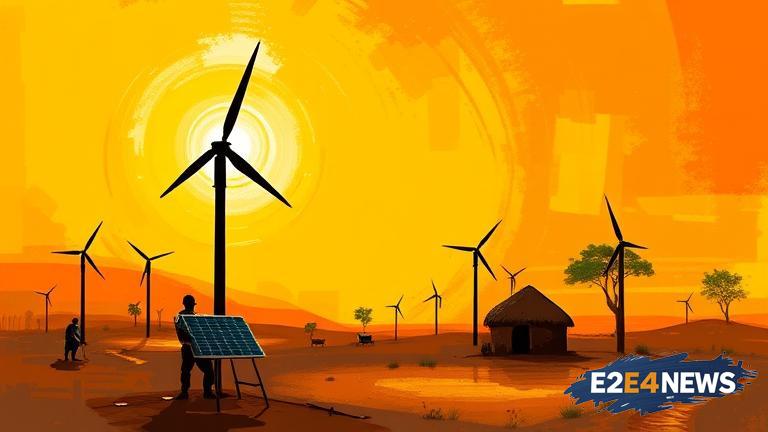Africa is undergoing a significant transformation in its energy landscape, with a growing focus on renewable energy sources such as solar, wind, and hydroelectric power. This shift is driven by the need to reduce dependence on fossil fuels, mitigate climate change, and provide energy access to the millions of Africans who currently lack it. The African Union’s Agenda 2063 has set ambitious targets for renewable energy adoption, aiming for at least 50% of the continent’s energy mix to come from renewable sources by 2030. Several African countries, including South Africa, Morocco, and Egypt, are already making significant strides in renewable energy development. South Africa, for example, has launched a series of renewable energy auctions, which have attracted significant investment and led to the development of numerous solar and wind farms. Morocco, meanwhile, has set a target of generating 52% of its electricity from renewable sources by 2030 and is investing heavily in solar and wind energy. Egypt is also pushing ahead with renewable energy development, with a focus on solar power and wind energy. The use of renewable energy is not only good for the environment, but it also has numerous economic benefits, including job creation and reduced energy costs. In addition, renewable energy can help to improve energy security, reduce reliance on imported fuels, and enhance energy independence. Furthermore, the adoption of renewable energy can help to reduce greenhouse gas emissions and mitigate the impacts of climate change. The African Development Bank has also launched a number of initiatives aimed at supporting the development of renewable energy in Africa, including the creation of a $500 million fund to support renewable energy projects. The bank has also partnered with the International Renewable Energy Agency (IRENA) to provide technical assistance and support to African countries looking to develop their renewable energy sectors. Other organizations, such as the World Bank and the European Union, are also providing significant support for renewable energy development in Africa. Despite the many benefits of renewable energy, there are still significant challenges to be overcome, including the need for significant investment in infrastructure and the development of supportive policies and regulations. However, with the right policies and support in place, Africa has the potential to become a leader in renewable energy development and to reap the many benefits that this can bring. The development of renewable energy in Africa is also expected to have a positive impact on the environment, by reducing greenhouse gas emissions and mitigating the impacts of climate change. In addition, the use of renewable energy can help to improve air quality, reduce water pollution, and protect biodiversity. The adoption of renewable energy can also help to promote sustainable development, by providing energy access to remote and rural communities and supporting economic development. Overall, the future of renewable energy in Africa looks bright, with many opportunities for growth and development. As the continent continues to transition towards a low-carbon economy, it is likely that renewable energy will play an increasingly important role in the energy mix. With the right support and policies in place, Africa can unlock the full potential of renewable energy and reap the many benefits that this can bring. The African renewable energy market is expected to continue to grow, driven by government support, declining technology costs, and increasing demand for clean energy. The market is also expected to attract significant investment, with many international companies and investors looking to tap into the continent’s vast renewable energy potential. In conclusion, Africa’s renewable energy revolution is gaining momentum, with many countries making significant strides in the development of solar, wind, and hydroelectric power. With the right policies and support in place, the continent has the potential to become a leader in renewable energy development and to reap the many benefits that this can bring.
